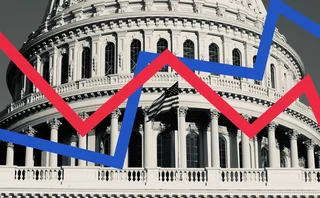
CCP basis and the future of cleared swap pricing
Dealers predict "more granular" pricing for cleared trades, after CME-LCH basis blow-out

The lifecycle of a trade is often split into two hemispheres. There are things that happen prior to the trade being executed – quote requests, the communication of bids and offers, credit checks and so on – and things that happen afterwards.
Clearing is one of the many things that belong in this post-trade world, so an outsider looking in at the swap market might find it odd that an otherwise-identical transaction would vary in price depending on a customer's choice of clearing venue. The pre-trade and post-trade worlds are somehow bleeding into each other, they might think – the walls between them twisting into a Möbius strip.
To an insider, there's nothing strange about this. It might make sense to think about pre- and post-trade separately from an operational or regulatory point of view, but in terms of the economics, the choice of clearing house will determine how much margin the bank has to stump up and what kind of collateral is acceptable. That should be reflected in the price.
Traders learned these lessons in 2009 and 2010, when collateral agreements on bilateral trades first started to determine the swap discount rate, and introduced the market to a brand new form of arbitrage (Risk June 2013). They were reinforced in 2012 and 2013, when banks started to upfront the funding costs arising when an uncollateralised trade is hedged with a collateralised one, in the form of the funding valuation adjustment (FVA).
So it shouldn't be a surprise that – if a product can be cleared at two central counterparties (CCPs), and one of them has a directional book of trades - dealers would seek compensation for the margin costs associated with new risk-additive trades. In fact, it's more surprising that the basis between CME Group and LCH.Clearnet was not being priced in far earlier – if that had been the case, its eventual surge in May would not have been so dramatic.
For any given trade that could clear at more than one CCP, a dealer will have a preferred choice
The more divisive question is how far to take it. For any given trade that could clear at more than one CCP, a dealer will have a preferred choice – the one at which the trade will be most risk-reducing, least risk-additive, or cheapest for that specific bank to fund. In theory, the price might be shaded to reflect that. The basis, then, might not be a single figure that applies across the Street to all trades of a given type. It might be dealer- rather than CCP-specific.
This kind of development is hinted at by two traders in this month's lead stories. One says banks will have to deal with CCP basis by pricing some trades "in a more granular way relative to what we have currently". The second warns a basis could pop up for any product cleared at two different CCPs, then adds: "There should be one in theory, because no-one will ever have the same position between two clearing houses."
In other words, cleared swap trades might not be immune to the kind of pricing diversity that now afflicts the bilateral market.
Only users who have a paid subscription or are part of a corporate subscription are able to print or copy content.
To access these options, along with all other subscription benefits, please contact info@risk.net or view our subscription options here: http://subscriptions.risk.net/subscribe
You are currently unable to print this content. Please contact info@risk.net to find out more.
You are currently unable to copy this content. Please contact info@risk.net to find out more.
Copyright Infopro Digital Limited. All rights reserved.
As outlined in our terms and conditions, https://www.infopro-digital.com/terms-and-conditions/subscriptions/ (point 2.4), printing is limited to a single copy.
If you would like to purchase additional rights please email info@risk.net
Copyright Infopro Digital Limited. All rights reserved.
You may share this content using our article tools. As outlined in our terms and conditions, https://www.infopro-digital.com/terms-and-conditions/subscriptions/ (clause 2.4), an Authorised User may only make one copy of the materials for their own personal use. You must also comply with the restrictions in clause 2.5.
If you would like to purchase additional rights please email info@risk.net
More on Markets
Wild dollar swing upended FX options hedges
Banks chased vol higher as last week’s EUR/USD surge knocked out barrier trades
How US shutdown set off long-awaited basis bet
Hedge funds dust off a years-in-the-making relative value trade to profit from fallback mismatch
ECB seeks capital clarity on Spire repacks
Dealers split between counterparty credit risk and market risk frameworks for repack RWAs
FXSpotStream expands into US Treasuries trading
Bank-owned streaming venue targets mid-year launch, offering “all you can eat” subscription fees
Crisis-era CDO protection keeps on giving for Athene
Apollo-owned insurer still sees payments from sold CDS protection on a 2006 synthetic resecuritisation
The changing shape of variation margin collateral
Financial firms are open to using a wider variety of collateral when posting VM on uncleared derivatives, but concerns are slowing efforts to use more non-cash alternatives
Will lifer exodus kill Taiwan’s NDF market?
Traders split over whether insurers’ retreat from FX hedging is help or hindrance
How Australia’s inflation overhaul could lure global traders
Australia’s move to monthly inflation reporting set to revitalise local inflation-linked bond and swap markets








